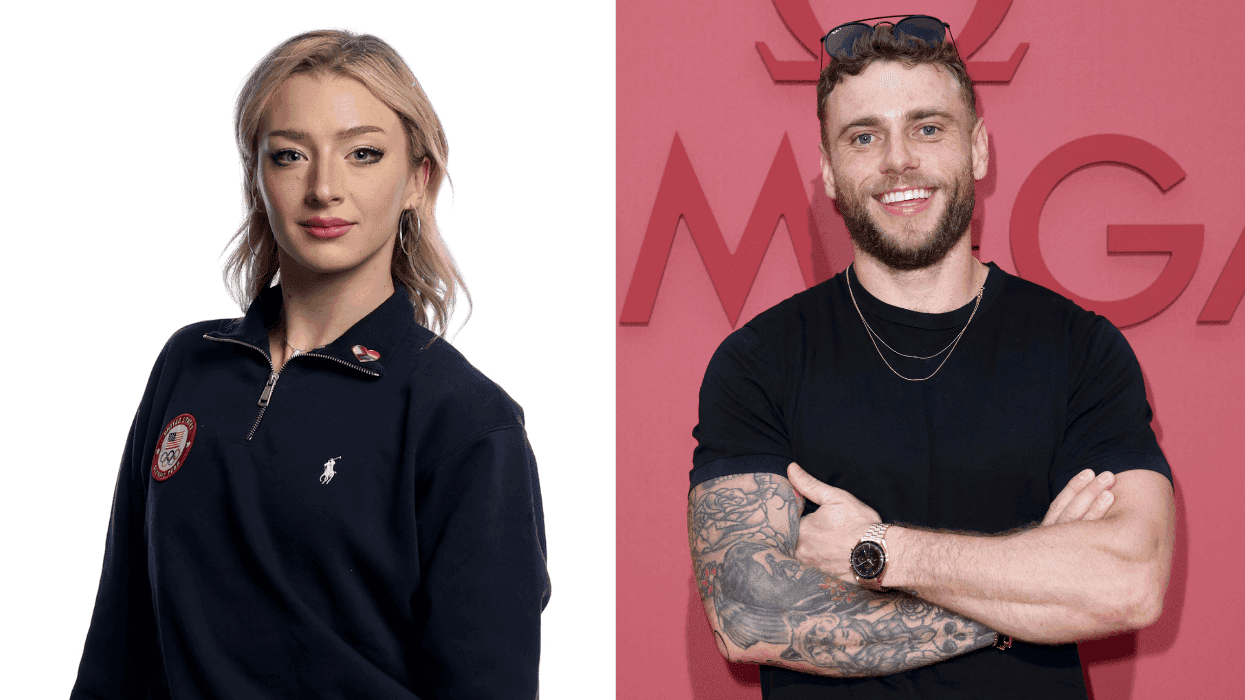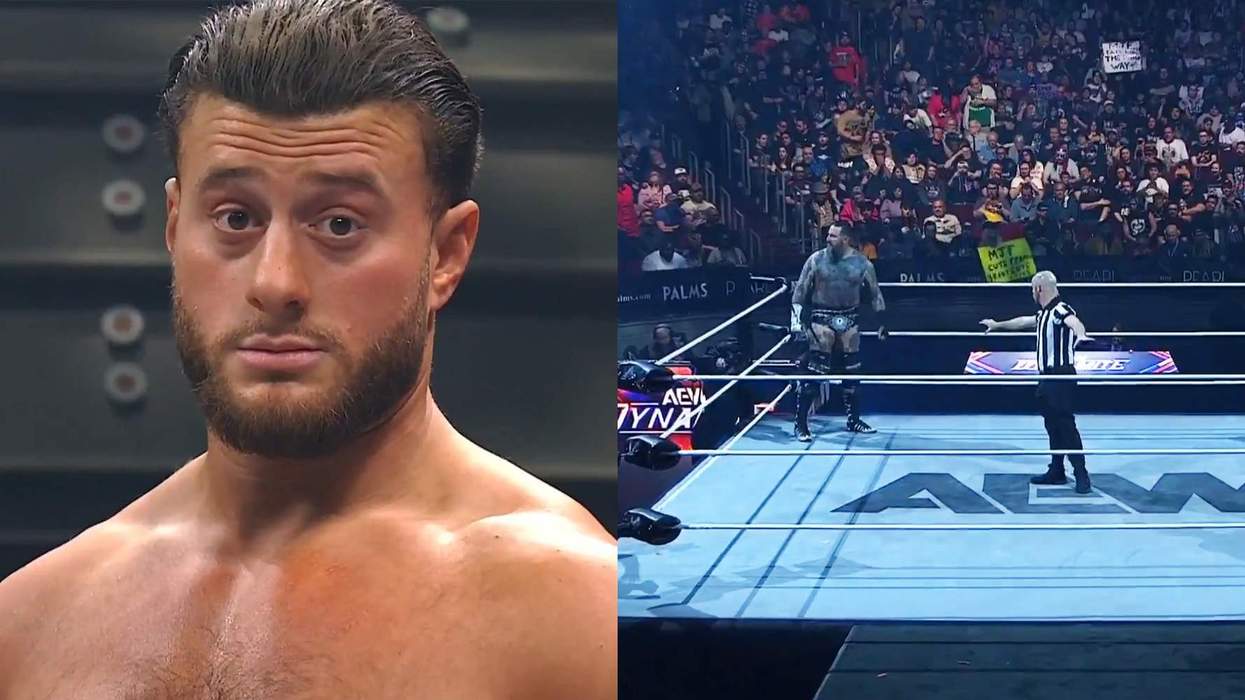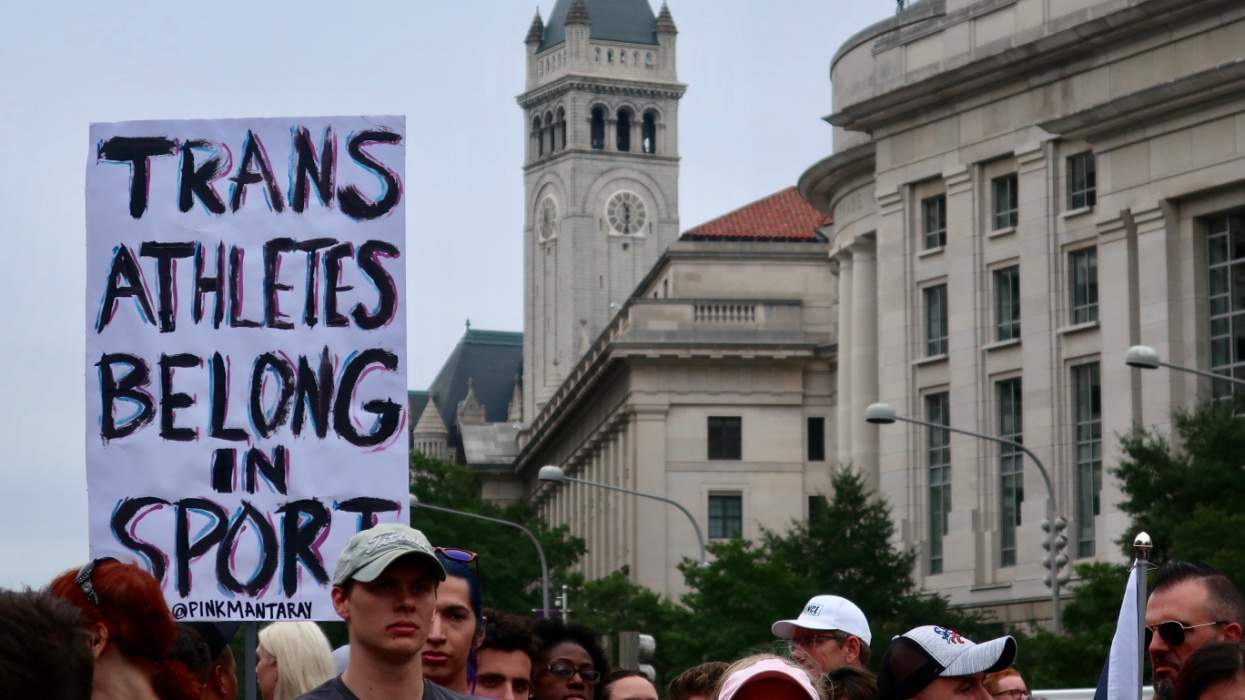The National Collegiate Athletic Association has given in to Donald Trump’s executive order designed to keep transgender women out of women’s and girls’ school sports.
Keep up with the latest in LGBTQ+ news and politics. Sign up for The Advocate's email newsletter.
Trump signed the order Wednesday, saying federal funding would be withheld from K-12 schools, colleges, and universities that allow trans females, whom he called “men,” to compete alongside cisgender women. Executive orders are not laws but have to be implemented by federal agencies. This order and any policies stemming from it are likely to be challenged in court.
Still, NCAA President Charlie Baker said Thursday that the organization would comply. “The NCAA is an organization made up of 1,100 colleges and universities in all 50 states that collectively enroll more than 530,000 student-athletes,” said a statement from Baker. “We strongly believe that clear, consistent, and uniform eligibility standards would best serve today's student-athletes instead of a patchwork of conflicting state laws and court decisions. To that end, President Trump’s order provides a clear, national standard.
“The NCAA Board of Governors is reviewing the executive order and will take necessary steps to align NCAA policy in the coming days, subject to further guidance from the administration. The Association will continue to help foster welcoming environments on campuses for all student-athletes. We stand ready to assist schools as they look for ways to support any student-athletes affected by changes in the policy.”
This came even though Baker recently testified before a U.S. Senate panel that fewer than 10 transgender athletes currently compete in NCAA sports, meaning transgender athletes make up an infinitesimally small fraction of collegiate sports participants.
From 2011 to 2022, the NCAA allowed trans women to participate in women’s sports as long as they had completed a year of testosterone suppression. The NCAA changed that policy in 2022, allowing each sport’s governing body to set the standards.
Last year, the National Association of Intercollegiate Athletics, which represents small colleges and universities, barred trans women from competing in women’s sports. The NAIA has 241 member schools, mostly small and private, representing about 83,000 athletes.
Twenty-seven states restrict trans participation in school sports, either by law or agency policy. Some of the restrictions apply to trans males as well as females, and some to colleges and universities as well as K-12 schools.
Trump also said he would direct the Department of Homeland Security to deny visas to trans women athletes from overseas seeking to enter the U.S. for the 2028 Olympics in Los Angeles.
Lambda Legal condemned what it called the NCAA's "eager capitulation" to Trump's order, with Senior Attorney Carl Charles issuing this statement:
“Lambda Legal could not be more disappointed by the response issued by NCAA President Charlie Baker to President Trump’s February 5, 2025, executive order aiming to ban transgender girls and women from all school sports programs affiliated with institutions that receive federal funds — that is, the overwhelming majority of schools in our country. NCAA leadership says it 'strongly believes' that a clear, consistent rule of excluding these students will 'best serve today’s student-athletes.' It’s hard to fathom how this can be so. A 'clear, consistent' directive to exclude based on disinformation only serves to reward ignorance and prejudice, and to inflict gratuitous pain. And make no mistake, the definition of sex in President Trump’s January 20 executive order, which is imposed by this sports order, is simplistic, scientifically erroneous nonsense. It ignores variations of human development, documented for almost a century, that are undeniable fact. And the core theme of this new order barring trans students from their schools’ sports programs is that they create danger for non-transgender girls and women. This is a pernicious falsehood.
“Blanket exclusions of vulnerable minority groups—driven by falsehoods and fearmongering — never serve anyone well. Not those ostracized and not the dominant majority either, as our country’s shameful history of other blanket exclusions based on falsehoods repeatedly has taught.
“The NCAA’s fast, wholesale embrace of this order is even harder to understand because the organization’s mission only concerns collegiate competition. The order, on the other hand, applies to all types of K-12 athletic activity — including kindergarten games, middle school track meets, high school scrimmages, college intramural tournaments, as well as elite intercollegiate competitions. No matter the sport and level of participation, deeming the participation of transgender girls and young women an unfair safety threat unjustly denies them the proven health, social, and relational benefits of sports participation that should be available for all youth, full stop.
“The NCAA’s apparently eager capitulation might be understandable given the heavy-handed coercion — blackmail really — by the President. But how fast and far this prestigious organization has fallen from its leadership in 2016 against North Carolina’s notorious anti-trans law, HB2, which was explained with similar smears. Then, as a sharp rebuke to the discrimination and fearmongering leveled by state legislators, the NCAA directed the relocation of its high-profile championships to another state. Now, less than ten years later, it offers an empty promise “to help foster welcoming environments … for all student-athletes,” while abandoning those who need that welcome most.
“We look forward to the day when the NCAA recovers its footing and is again able, per its mission, to 'provide a world-class athletics and academic experience for student-athletes that fosters lifelong well-being' for all athletes, not just those who are cisgender. And for now, we applaud the informed voices of those organizations and the over 400 current and former NCAA, Professional, Olympic and Paralympic athletes who called on the NCAA last year to ensure that “the lifesaving power of sport is accessible to all athletes…including transgender athletes.”















Charlie Kirk DID say stoning gay people was the 'perfect law' — and these other heinous quotes
These are some of his worst comments about LGBTQ+ people made by Charlie Kirk.